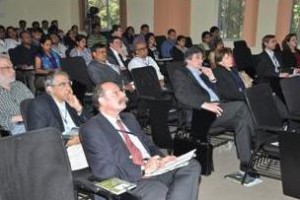18th January 2013 New Delhi, India
Understanding climate change: working together
Last week I visited the Indian Institute for Science where a distinguished delegation of academics from Imperial College London were holding a joint workshop organised by the Grantham Institute for Climate Change at Imperial and the Divecha Centre for Climate Change at IISc Bangalore.
Aside from a fabulous lunch up in the trees of IISc’s beautiful campus, it was a fascinating day. But I thought I’d hand over to Dr Simon Bailey (guest blogger), one of the visiting party, to tell you about it. A fuller account of the day, plus the presentations made, is available on the Grantham Institute’s website at Imperial College London. (Tom Wells)
The workshop, entitled ‘Understanding climate change: working together to meet the challenges’, explored the challenges faced by communities in India and beyond, discussed the contribution that research universities could make to tackling these issues, and focussed on two key areas, namely solar power and low-carbon resilient cities.

The workshop participants included senior decision makers in business and government and were welcomed by the IISc Director, Professor Balaram. Imperial’s President and Rector, Sir Keith O’Nions, highlighted the synergies between basic research and translation, both grounded in the world-class research taking place at Imperial. Growing economic interdependence together with the global nature of some of the major issues affecting countries today, meant that strong research collaborations between universities, business and governments were vital in addressing societal challenges such as climate change, health and energy.
Karnataka’s Chief Secretary, Mr Ranganath, also emphasised the need for expert advice and guidance to help governments make the right decisions. He noted five main challenges faced by Karnataka: food, water, and energy security, continued urbanisation, and finally climate change, which had the potential to impact all preceding challenges if left unchecked. Measures taken to deal with climate change would need to support continued growth and development, and improve the life and wellbeing of citizens in a resource-efficient manner.
The tension between economic development and mitigation produced a variety of perspectives. Some argued that growth and development of poor regions such as India should come first. Professor Srinivasan, Chairman of the Divecha Centre, argued that India’s emissions were only a small part of the global problem and that arguments for renewable energy based on energy security and health would be more effective in driving change. Professor Sir Brian Hoskins, Director of the Grantham Institute, reminded participants of the huge importance of the monsoon, which was at risk from climate change.
More frequent droughts or flooding events put at risk food and energy security for those populations affected. It was this risk that might enable governments, business and academia to change the terms of the debate in India. Climate change was central to planning India’s future development trajectory.
During the final session for the day, a distinguished panel highlighted the need to better understand the geographical regions in which potential solutions will be developed, so that the right mix of options is applied according to the resources available. There was a positive message for the potential development of solar in India, but there was also a need to encourage more innovation and communicate the issue of climate change more strongly to those in a position to support low-carbon development.

Summing up, Professor Srinivasan noted that there was a leadership vacuum in this area and that countries will look to India, UK, EU and USA to show new directions to respond to the issues of resource scarcity and climate change.
Simon Bailey
I think this is among the most vital information for me. And
i’m glad reading your article. But should remark on some general things, The site style is perfect, the articles is really great : D. Good job, cheers
Hi! This is my first visit to your blog! We are a team of
volunteers and starting a new initiative in a
community in the same niche. Your blog provided us
beneficial information to work on. You have done a wonderful job!